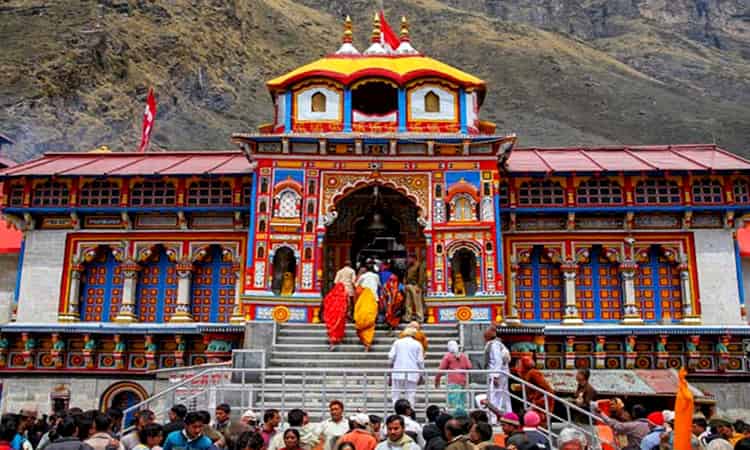Situated on an elevation of 3,300 metres above sea level, Badrinath Dham is an important place of pilgrimage for all Vishnu Bhakts. Located in the dis
Situated on an elevation of 3,300 metres above sea level, Badrinath Dham is an important place of pilgrimage for all Vishnu Bhakts. Located in the district of Chamoli, the temple graces the banks of the holy Mandakini River. Badrinath is one of the 108 Divya Desams in India and a major Char Dham temple. The temple is nestled away in the green hills of the lush Garhwal region. Badrinath is famous for being one of the major pilgrimage spots with a foot fall of over lakhs of pilgrims and devotees during the peak tourism season. Steeped in various legends and historical events, the temple’s foundation was established by Adi Shankaracharya during the 7th-8th century. Other than the temple one can even plan a visit to some nearby tourist attractions near Badrinath. These places are Valley of Flowers, Hemkund Sahib, Tapt Kund, Mana Village, Bheem Pul, Surya Kund, Vasudhara Waterfalls and many more. The temple is set against the backdrop of snowcapped mountain ranges of Nar Narayan Parbat. The presiding deity of Badrinath Dham is Lord Badri who is a form of Lord Vishnu and the lord of Badri Kshetra.

While planning a trip to Badrinath Dham, it is important to make sure that you go there during the right time. Here is everything you need to know about Badrinath weather conditions throughout the year:
Badrinath Temperature Today
Badrinath in Summer Season
The months of March to June mark the summer season in Badrinath Dham. Ideally this is also the peak tourist season in the area. The temperature remains comfortable during the day although it may rise during the night time. The average temperature ranges between 11 to 16 Degree Celsius. Along with pilgrimage many people opt to go for additional sightseeing experiences in the nearby tourist spots as well. The sky remains clear with the sun shining brilliantly. Even if it is summer, remember to pack some woollen clothing items as it gets quite chilly as the sun sets. This is also the time when the region is least susceptible to dangerous flooding or unpredictable landslide situations.
Badrinath in Monsoon Season
Monsoon season is considered as the most dangerous time to travel anywhere on the hills. Try avoiding visiting Badrinath during the peak monsoon months of early July to September. The temperature drops dramatically during this time as well averaging around 14 to 11 Degree Celsius. Roads get blocked due to random landslides and road blockages. Sudden flooding may also be an alarming situation. Several Badrinath Dham Yatra by Helicopter trips remain cancelled during this time as well. Make sure to book your Char Dham or Badrinath Dham yatra package during a safe travel time in order to avoid any future problems. This may cause harm not only to your budget but to your life as well. Remember that the Himalayan hills are extremely sensitive zones and are still in the making. They are easily prone to sudden landslide situation that worsens during the monsoon season with the rains.
Badrinath in Winter Season
The winter season in Badrinath lasts from October to April. During these months the region receives constant snowfall and remains covered in a thick blanket of snow throughout. Travelling and pilgrimage remains shut down for the season. The idol of the presiding deity of Lord Badri is transferred to his nearby home in Joshimath where the pilgrims continue to shower him with prayers. The local residents and business people of the region also shift downward to the lower reaches of the hills. This enables them to live a better life during the harsh winter months. Badrinath Dham Temple remains engulfed in a thick snow cover for a majority of the winter season.
Best Time to Visit Badrinath Dham
It goes without saying that the safest and the best time to visit Badrinath Dham is during the summer season. The temple opens during the holy day of Akshaya Tritiya and shuts down by Diwali. Months from the time of its opening to early July is the most preferred time to travel not only to Badrinath but also to anywhere on the hills. During the best time to visit one can even cover many different nearby tourist attractions as well. It would be a wholesome experience to plan a trip to Badrinath Dham during these months.
Weather Tips for Badrinath Visit
Weather is the most crucial and often an overlooked factor while planning a pilgrimage to Badrinath Dham. Here are some of the weather tips for Badrinath Dham visit:
- Make sure to plan your pilgrimage for Badrinath during the summer months. If booking a tour package then make sure its during the said summer months.
- Always carry some good woollen clothing like jackets, sweaters, mufflers, ear muffs, a good pair of reflectors etc. no matter what the season is.
- Don’t forget to carry an umbrella or raincoat while travelling since the weather conditions in the Himalayas are extremely unpredictable and it may change at any time.
- Remember to only book helicopter rides during the best time to visit months in Badrinath Dham and not during the monsoon season.
Conclusion:
Badrinath Yatra is one of the holiest pilgrimages anyone can take in a lifetime. This spiritual journey is dedicated to Lord Vishnu and is said to bring immense peace and moksha in everyone’s life. Being a holy destination and located close to some of the most famous tourist attractions in Uttarakhand, it receives a constant and heavy footfall of both adventure seekers and devotees.


COMMENTS